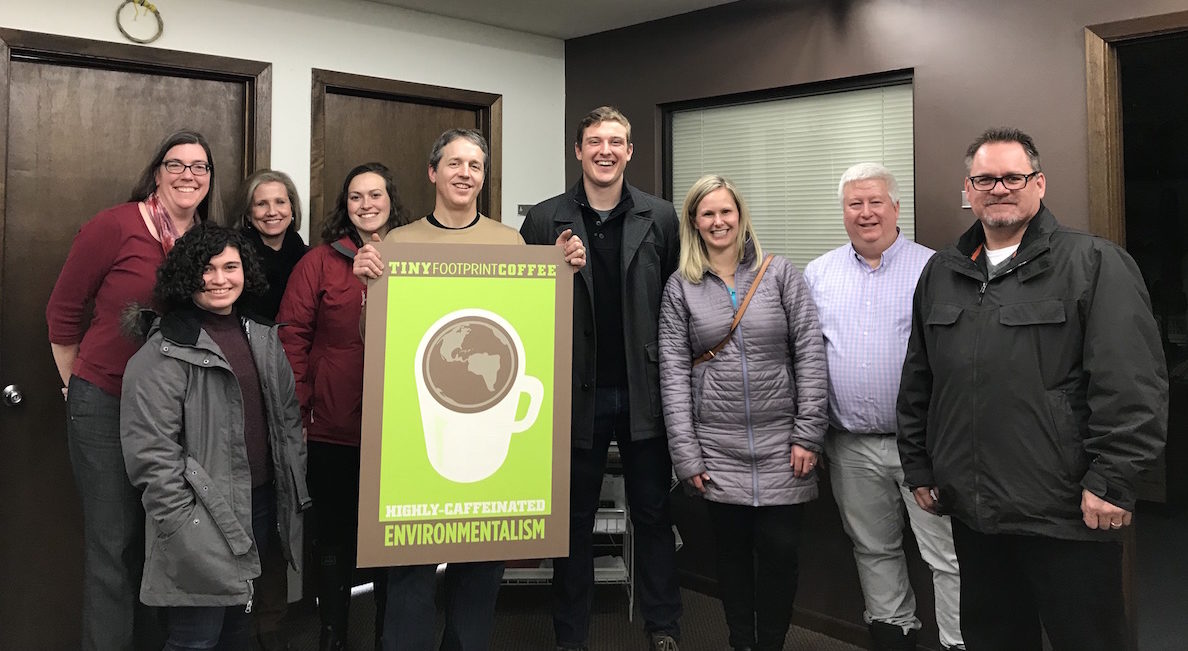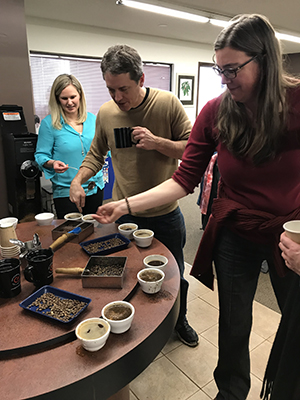Tasting Tiny Footprint’s Big Impact at Macalester College
- by Peter Todaro

The Tiny Footprint tour group, left to right: Macalester Sustainability Manager Suzanne Hansen, student Lydia Sulik, Associate Vice President for Finance Patricia Langer, student Molly Flerlage, Tiny Footprint owner Alan Krohnke, Bon Appétit Fellow Peter Todaro, Catering Director Amy Jackson, Director of Labor and Productivity Kent Buell, and Macalester Director of Purchasing, Auxiliaries, and Accounts Payable Matt Rumpza
Based in Brooklyn Center, MN, artisanal coffee roaster Tiny Footprint Coffee has an outsize buzz on Bon Appétit campuses throughout the Upper Midwest.
At Macalester College in Saint Paul, MN, it makes up all catered and retail coffee, and recently, students, staff, and the Bon Appétit team had an amazing opportunity to visit the roastery, meet Tiny Footprint owner Alan Krohnke, and learn about what makes mission-driven companies like his successful — and of course taste some great coffee.

Amy Jackson, director of catering for Bon Appétit at Macalester; Alan Krohnke, owner of Tiny Footprint; and Suzanne Hansen, Macalester sustainability manager trying different Tiny Footprint coffee beans
Alan had previously opened Roastery 7, an artisanal coffee roasting company, while his brother Brian had worked with the Mindo Cloudforest Foundation, supporting the reforestation and protection of the critically endangered ecosystem in Ecuador. In 2010, they joined together to create Tiny Footprint Coffee, a company with a groundbreaking mission: carbon negative coffee.
Many coffee consumers around the world don’t know that the way their coffee is grown contributes to deforestation, with large coffee plantations occupying vast swathes of land where dense lush forests — which act as carbon sinks — used to be. There’s also carbon emitted through the transportation of coffee from South American, African, and Pacific origins to developed markets where consumers purchase a vast quantity of it. Alan and Brian determined that 1 pound of coffee equals around 4 pounds of carbon emissions, so they created a business model in which trees are planted to revitalize the Mindo Cloudforest, sequestering on average 54 pounds of carbon for each pound of coffee sold.
Between a coffee cupping event, in which four different types of coffees were slurped, and a tour of the roastery itself, attendees got an educational experience that left a lasting impression about what otherwise might be an overlooked facet of their daily experience: the coffee many drink at Mac every day.